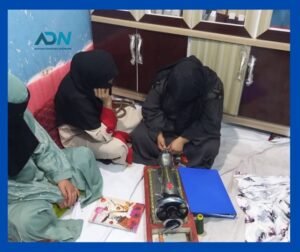Herat Earthquake Is A Tragic Testament to the Consequences of Gender-Discriminatory Policies

Afghan Cultural Association (AKIS) Distributes Emergency Food Aid to Earthquake-Affected Families in Western Afghanistan. Photo: @AKIS
By Nazila Jamshidi
The profound consequences of over 50 edicts, orders, and restrictions, which collectively represent one of the most systematic and unprecedented assaults on the rights of women and girls, have become tragically evident in the higher casualty rates among women and girls in recent earthquakes in Herat. The Taliban’s establishment of a system marked by the severe oppression of women, which rightfully is considered gender apartheid, has resulted in a situation where, as of October 19, 58% of the adult fatalities in the earthquakes, 60% of the injured and 61% of those reported as missing are women. These statistics are not only deeply concerning but also a clear illustration of the immediate, detrimental impact of a regime characterized by gender apartheid on women and girls.
A series of 6.3-magnitude earthquakes that struck Herat province repeatedly throughout October has tragically claimed the lives of 2,400 people, with the death toll expected to increase as people continue to search for potential survivors trapped in the debris of collapsed homes. While this disaster has profoundly affected all residents of Herat, women and children have borne a disproportionate burden. As noted by Alison Davidian, UN Women’s Representative in Afghanistan, “The majority of persons killed, injured, or missing as a result of the Herat earthquakes were women – trapped inside their homes as a result of increasing restrictions.”
The repercussions of this disaster extend far beyond the tragic loss of lives and physical injuries. Women are confronted with significant protection concerns in the aftermath of the earthquakes, including the lack of access to secure shelter, clean water, and food, as well as limited access to latrines. Compounding this situation is the fact that women volunteers and female members of disaster response teams are often restrained from being present to listen to and address the needs of women effectively, as well as ensuring that assistance is provided to women in a meaningful way.
Furthermore, cultural norms and restrictions on women’s mobility impede their ability to seek support to meet their own needs and those of their children. Many of those who have lost their primary breadwinners, typically male, find themselves living in tents and relying on food distributed by humanitarian organizations for survival. As the harsh winter rapidly approaches, the women affected by this disaster are in dire need of shelter, access to clean water, and essential winter supplies such as warm blankets and clothing. These necessities are critical not only for preventing the outbreak and severity of infectious diseases but also for safeguarding women from the risk of sexual violence. The ban on women working and traveling without a Mahram (a male guardian) not only prevents women from supporting their families within the country but also hinders their ability to seek opportunities in other countries to do so.
Women’s Suffering and Vulnerability
The immediate and long-term consequences of the Taliban’s policies on women have begun to manifest in every facet of women’s lives. The earthquake in Herat was not the first catastrophe that the people of Afghanistan endured during the second phase of the Taliban regime, and unfortunately, it is unlikely to be the last, given the ongoing humanitarian and economic crises in the country.
The Herat earthquake serves as a powerful yet tragic illustration of the impact of anti-women policies. As long as women continue to be systematically and deliberately oppressed, their lives will remain vulnerable to the effects of both natural and man-made disasters. This is not a mere anticipation but a heartbreaking reality that has just been witnessed in Herat. Unless the international community collectively acknowledges the existence of gender apartheid and coordinates governmental and international responses to counter the Taliban’s systematic oppression of women, women will persistently endure disproportionate suffering in the face of any crisis.
Nazila Jamshidi – a gender equality and human rights specialist involved in Afghanistan’s development and democracy processes for the past decade – has worked for the UN, USAID, the International Federation of Red Cross.
Note: The contents of the article are of sole responsibility of the author. Afghan Diaspora Network will not be responsible for any inaccurate or incorrect statement in the articles.






